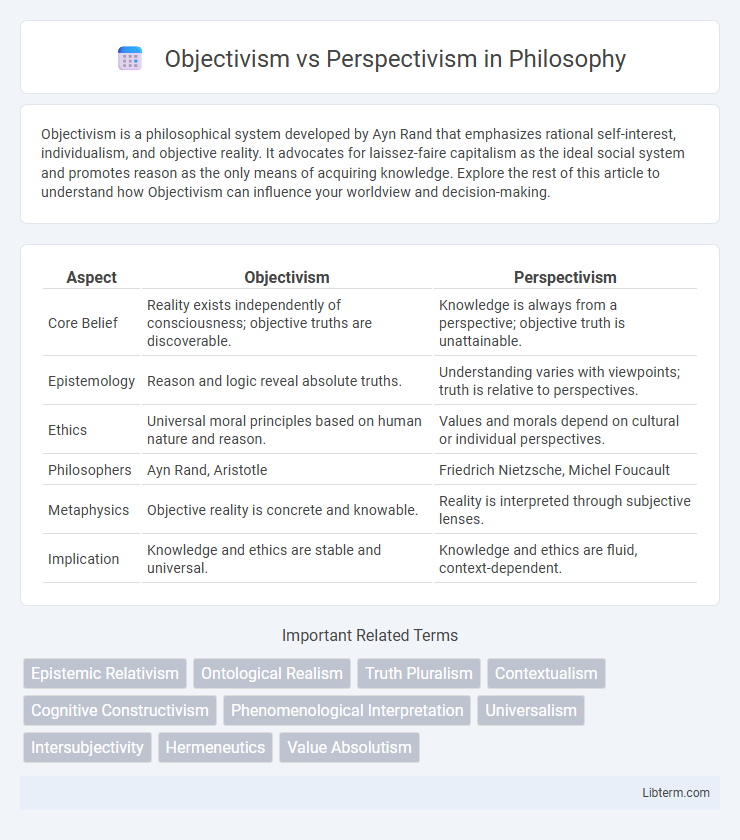Objectivism is a philosophical system developed by Ayn Rand that emphasizes rational self-interest, individualism, and objective reality. It advocates for laissez-faire capitalism as the ideal social system and promotes reason as the only means of acquiring knowledge. Explore the rest of this article to understand how Objectivism can influence your worldview and decision-making.
Table of Comparison
| Aspect | Objectivism | Perspectivism |
|---|---|---|
| Core Belief | Reality exists independently of consciousness; objective truths are discoverable. | Knowledge is always from a perspective; objective truth is unattainable. |
| Epistemology | Reason and logic reveal absolute truths. | Understanding varies with viewpoints; truth is relative to perspectives. |
| Ethics | Universal moral principles based on human nature and reason. | Values and morals depend on cultural or individual perspectives. |
| Philosophers | Ayn Rand, Aristotle | Friedrich Nietzsche, Michel Foucault |
| Metaphysics | Objective reality is concrete and knowable. | Reality is interpreted through subjective lenses. |
| Implication | Knowledge and ethics are stable and universal. | Knowledge and ethics are fluid, context-dependent. |
Defining Objectivism and Perspectivism
Objectivism asserts that reality exists independently of consciousness and that truths are objective, universal, and discoverable through reason and evidence. Perspectivism holds that knowledge and truth are always interpreted through individual perspectives, emphasizing that all understanding is influenced by subjective viewpoints and contexts. While Objectivism prioritizes absolute facts, Perspectivism highlights the inevitability of interpretation shaped by personal and cultural perspectives.
Historical Origins and Key Philosophers
Objectivism, rooted in Ayn Rand's mid-20th-century philosophy, emphasizes an objective reality independent of individual beliefs, advocating rational self-interest and laissez-faire capitalism. Perspectivism, primarily developed by Friedrich Nietzsche in the late 19th century, rejects absolute truths and asserts that knowledge is always from a particular perspective shaped by context and interpretation. These contrasting epistemologies highlight Rand's commitment to reason and universal facts versus Nietzsche's focus on interpretive frameworks and the fluidity of truths.
Core Principles of Objectivism
Objectivism, founded by Ayn Rand, emphasizes objective reality, rational self-interest, and individual rights as its core principles, asserting that reality exists independent of consciousness and that reason is the only means to acquire knowledge. It promotes laissez-faire capitalism as the purest social system to respect individual freedom and reject collectivism. Perspectivism, in contrast, argues that all knowledge is interpretative and conditioned by individual perspectives, challenging the Objectivist claim of objective truth.
Fundamental Tenets of Perspectivism
Perspectivism asserts that all knowledge and truth are inherently tied to specific perspectives shaped by individual contexts, experiences, and interpretations. It denies the existence of absolute, objective truths, emphasizing instead the plurality and relativity of viewpoints as fundamental to understanding reality. This view contrasts with objectivism, which upholds fixed truths independent of personal bias or framework.
Contrasts in Epistemology
Objectivism asserts that knowledge reflects absolute truths independent of individual perceptions, emphasizing objective reality as the foundation of epistemology. Perspectivism, in contrast, holds that knowledge is inherently subjective, shaped by varying perspectives and contexts, rejecting the existence of a single, universal truth. This contrast highlights a fundamental epistemological divide between believing in immutable facts versus context-dependent interpretations of reality.
Ethics: Absolute Truth vs Relative Understanding
Objectivism asserts ethics are grounded in absolute, universal truths that exist independent of individual beliefs or cultural contexts, emphasizing objective moral principles valid for all. Perspectivism challenges this by promoting relative understanding, where moral values and ethical judgments depend on individual perspectives and cultural frameworks, rejecting fixed, universal standards. This contrast highlights the debate between fixed ethical truths and the fluidity of moral interpretation influenced by subjective experiences.
Objectivity and Subjectivity in Science
Objectivism in science emphasizes the existence of universal truths and objective facts independent of human perception, promoting reproducibility and empirical validation as key standards. Perspectivism argues that scientific knowledge is influenced by subjective viewpoints, cultural contexts, and interpretative frameworks, highlighting the role of individual and collective perspectives in shaping scientific understanding. The tension between objectivity and subjectivity in science drives debates on the reliability of scientific theories and the interpretation of data within evolving paradigms.
Implications for Art and Aesthetics
Objectivism in art asserts that aesthetic value resides in objective qualities such as form, balance, and harmony, emphasizing universal standards for beauty and truth. Perspectivism challenges this by proposing that artistic meaning and value are contingent on individual perspectives, cultural contexts, and interpretive frameworks. The clash between these philosophies impacts art criticism and creation by shaping debates on whether art should be judged by fixed criteria or by diverse, subjective experiences.
Impact on Modern Thought and Society
Objectivism, originating from Ayn Rand, emphasizes objective reality and rational self-interest, profoundly influencing modern libertarianism and capitalism by advocating individual rights and free markets. Perspectivism, rooted in Nietzschean philosophy, challenges absolute truths, encouraging diverse viewpoints that have shaped contemporary relativism and cultural pluralism. The tension between these philosophies drives ongoing debates on truth, ethics, and governance, impacting education, politics, and social discourse worldwide.
Navigating the Debate: Reconciliation or Divide?
Objectivism asserts the existence of absolute truths independent of individual beliefs, while Perspectivism argues that knowledge is inherently shaped by subjective perspectives. Navigating this debate requires analyzing how cognitive frameworks influence the interpretation of reality and whether a synthesis can accommodate both universal principles and contextual variability. Balancing objective facts with diverse viewpoints may offer a pathway toward reconciling these philosophical positions or highlight their fundamental divergence.
Objectivism Infographic

 libterm.com
libterm.com